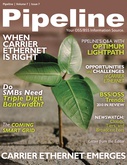|
|

At Austin Energy, which supplies power to one million homes and 41,000 businesses, CIO Andres Carvallo says that one of the biggest projects over the last few years has been “trying to streamline the IT architectures to be more flexible, while at the same time enhancing the customer service experience and increasing revenues by offering new services across the enterprise." Sound familiar?
OSS/BSS players are well situated to capitalize on the smart grid because they have services, software and systems in place to handle a wide variety of data management, customer experience management (CEM) and customer relationship management (CRM) problems that power cos will begin experiencing once the smart grid goes live. But with a new industry may come new problems.
|
|
It is hard to imagine the consequences of a coordinated cyber-attack on a nationally connected smart grid |
|


grid comes on-line, more and more
processes will be consolidated into few
locations. In the worst case scenario,
one concentrated cyber-attack
threatens the entire power grid. All the
players in the emerging field must be
aware of, and proactively guard
against, rapidly evolving cyber-threats.
However, there may be one threat that
is even harder for the fledgling smart
grid to guard against; consumers.
Consumer Confidence? What Consumer Confidence?
In a recent poll by GE, 79 percent of
Americans said they were unfamiliar
|
|
|
|
|

Hackers No Longer Just Killing the Music Industry
Over the last 18 months or so, Iran’s contentious nuclear program was crippled; not by a tuxedo-wearing James Bond-type secret agent, but by Stuxnet, a computer worm. Stuxnet may just be the most sophisticated computer worm ever designed; a worm that had to infiltrate very specific and heavily guarded computer systems, disrupt delicate nuclear machinery without destroying it (thus raising alarms), hide its existence then destroy itself after it had been discovered. It did all this and more, but here’s the kicker, it was targeting nuclear facilities that had no Internet connections.
It is hard to imagine the consequences
of a coordinated cyber-attack on a
nationally connected smart grid, and it
is even harder to imagine a power co
or OSS/BSS player that is capable of
managing such threats. Currently, the
power grid is relatively safe, as most
power generation is local and
distributed. Any one attack on an
individual power station is unlikely to
affect the national grid. As the smart
|
|

with the term “smart grid”. A quick
Google search reveals a surprising
amount of articles actively advocating
against the deployment of the smart
grid. Consumer complaints range from
increased bills (the new meters are
sometimes billed to the customer) to
data-related privacy concerns.
Companies, such as Texas based
CenterPoint, casually mentioning the
ability to cut a customer’s power in two
hours if they do not pay their bill are
not exactly helping the consumer
confidence index. But there is still time
to turn things around.
The benefits of the smart grid are too numerous, and the backing from major power cos and corporations too strong, for the technology to fail. If companies can effectively communicate the benefits to the consumer (lower bills, lower emissions, new technologies and services etc.) there is no limit to the growth potential. OSS/BSS players, with their years of experience with CEM and CRM, may be in a position to lead the way in growing consumer confidence. The only question that remains is; will they be ready?
|
|
|






